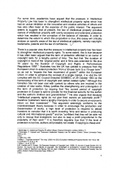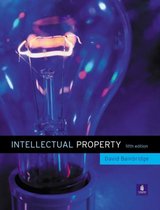For some time, academicshave arguedthat the pressurein Intellectual
PropertyLaw has been to strengthenintellectualpropertyrightswhich has
had an undueinhibitionon the innovative and creativeactivities
of othersand
has also often been at the expenseof the public interest.The argument
seems to suggestthat at present,the law of inteflectualpropertyprovides
propertywith overlyexcessiveand extensiveprotection
ownersof intellectual
which has resultedin the corruptionof the balanceof interests.In order to
determinethe extentto whichthis propositionis true,Jhisessaywill critically
anafyseon specificareasof the law of intellectualptdperty,namelycopyright,
trademarks,patentsand the law of confidence. V
Thereis a popularviewthat the pressurein intellectual propertylaw has been
to strengthenintellectualpropertyrights.To someextent,this is true because
it has often been arguedthat the term of protectionaffordedto an ownerof
copyrightlasts for a lengthyperiod of time. The fact that "the durationof
copyrightin mostof the 'originalworks'and in filmswas extendedto 'life plus
70 years' by the Durationof Copyrightand Rights in Performances
Regulations 1995",1illustrateshow the Uk nas yieldedto pressurefrom the
EuropeanUnionto extendprotection'from a 5O-yeartermto a 7o-yearterm"2
so as not to "impedethe free movementof goods"rwithin the European
Union.In orderto enhancethe conceptof a singlemarket,it is vitalthe UK
complieswiththe EC CouncilDirective93/98EECof 29 Oclober1993on the
harmonizing of the term of copyrightand certainrelatedrights.aAlthoughthis
transitionhas not been met with contentby otherswho are involvedin the
creationof new works,Kilbeyjustifiesthe strengthening and prolongationof
the term of protectionby arguing that "the current period of copyright
protectionin Europeis said to providefor the financialsecurityfor the author
and the author'schildrenand grandchildren".s He also arguesthat because
.intellectualpropertyrights do not give
their owners an automaticprofit",6
therefore"publishersneeda lengthymonopolyin orderto securean economic
return on their investment".'This argumentseeminglyconformsto the
incentive/reward theory becausein order to encouragethe productionand
disseminationof works, a high level of protectionis requiredto attract
investorsto considerthat it is worth investing"time and labourin producing
cufturaland informational goods"sand be "confidentthat they will be able not
only to recoupthat investment,but also to reap a profitproportionalto the
popularityof their work".elt is thereforearguablytrue that .if the level of
protectionis too low,authorswill probablynot create.lf copyingis cheapand
1 Bainbridge, D. lntellectual
Proprty 7thedition(Essex:PearsonEducationLimiled,2009)p 71.
2 Torremans,P. HolyoakaN TorremanslntellectualProWfty Law Sth edition(Oxford:OxfordUniversityPress,
2008)p 203.
3 lbid.
4 (1993)OJ L 290.
5 Kilbey,l. 'Copyright PropertyReview'l05-110 at 106.
duration?Too longl'(2003)Vol 25(3)Europeanlntellectual
6 Torremans, P. op cit.p 18.
7 Kilbey,l. op cit.at 105.
8 W. LandesandR. Posner,'An Econornic Law'(1989)18 Journalof LegalStudies325;W.
Analysisof Copyright
Gordon,'An lnquiryinto the Meritsof Copyright:The Chatlengesof Consistency,Consentand Encouragement
Theory'(1989)41 StanbrdLaw Review1343as citedin Bentley,L. and Sherman,B. IntelledualPropertyLaw 3rd
edition(Oxford:OxfordUniversityPress,2009)p 37.
9 rbid.
1





